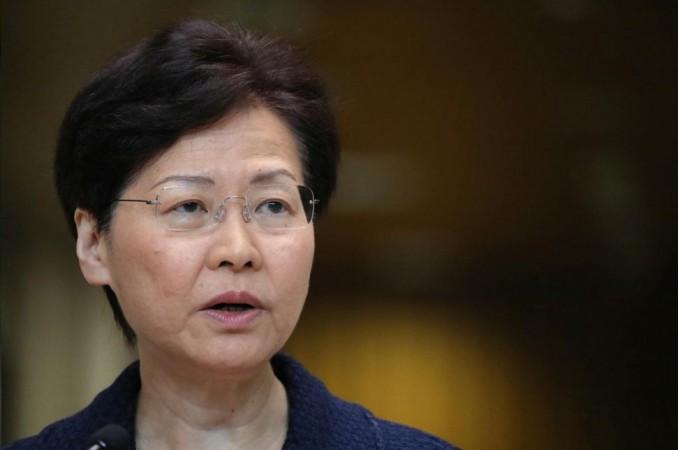
After three months of protests, that escalated into the city's largest political crisis, Hong Kong leader Carrie Lam is likely to formally withdraw the contentious extradition bill on Wednesday, September 4, according to reports.
The Chief Executive of Hong Kong will declare the bill's complete withdrawal in order to de-escalate the tensions and protests in the city, according to sources cited by the Post.
"This gesture to formally withdraw is a bid to cool down the atmosphere," a source said.
Reports suggested the announcement will likely be made during a meeting with 43 pro-Beijing officials at 4 pm local time at her official residence in Government Houses.
The withdrawal will make Hong Kong act upon the most important demand out of the five sought by activists and lawmakers - the bill's withdrawal, an independent investigation into police brutality, to stop describing the protests as "rioting", Lam's resignation from the governing body and resuming political reform.
The protest that began in June was primarily for full withdrawal of the proposed extradition bill that would allow China to pursue their political targets residing in the city ruled by the communist regime. However, the protests developed into a major political movement against Beijing's clampdown on freedom of independent judiciary and the right to protests that have threatened Hong Kong's sovereignty.
Lam has been severely criticised for agreeing to hold dialogues and listen to the demonstrators but refusing to commit to withdraw the bill. Critics have said that her repeated usage of the term "dead" instead of "withdrawal" while referring to the bill indicates legal manoeuvres through which the bill could be revived in the future.
Increasing violence
The demonstrations over the weekend turned most violent since June. The protesters burnt barricades, threw petrol bombs and the police retaliated with water cannon, tear gas and batons.
Three men, aged between 21 and 42, were taken to Kwong Wa Hospital late on Tuesday after riot police fired beanbag gun and pepper spray to disperse demonstrators outside the Mong Kak police station. Televised footage showed one man being taken to the hospital on a stretcher with an oxygen mask on his face.
A hospital spokesperson told Reuters that two protesters including the man taken in a stretcher were in stable condition and one had been discharged.
More than 900 people have been arrested, including noted pro-democracy activist Joshua Wong, known for leading the Umbrella Movement in 2014.
Chinese interventions
Carrie Lam on Tuesday rebuffed claims of Beijing stopping her from stepping down.
Lam was heard saying in an audio record released earlier that her efforts were "very, very limited" in solving the political crisis. She went on to say that she has to serve "two masters" as the issue has moved "to a national level", a suggested reference to the Chinese leadership.
At the weekly Executive Council meeting, Lam clarified that she never contemplated resignation over the ongoing protests and asserted that the city could solve the issues without interventions from China.
The Chinese foreign ministry in its response to the report said that the central government "supports, respects and understands" Lam's decision to suspend the bill, according to Reuters.
While Lam expressed her disappointment that the audio clip of her comments at a private meeting had been leaked, Chinese state media Global Times denounced the records as "fake".
China has accused foreign powers, particularly the United States and Britain, of inciting the unrest.
The deadlock between the protesters and authorities as well as Hong Kong's first recession in a decade has raised concerns that the city's government may push for emergency laws that will include permission to carry out detention, censorship and curfews.
Lam on Tuesday stated that the government is considering all "legal approaches" in solving the political crisis.








